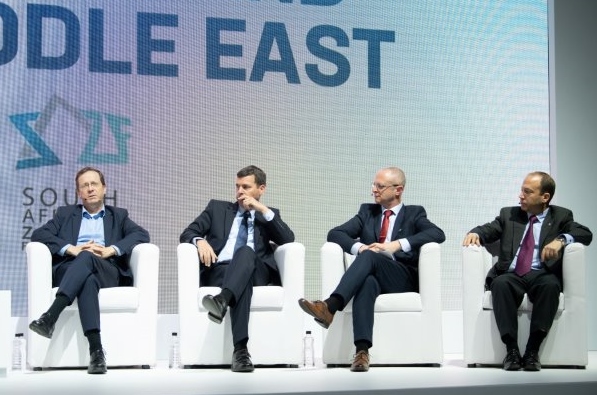click to dowload our latest edition
CLICK HERE TO SUBSCRIBE TO OUR NEWSLETTER


Published
5 years agoon
By
adminJORDAN MOSHE
The Arab Spring, regional conflicts, and the rise of extremism are among the factors that account for the shifts witnessed in recent years, but the situation remains highly changeable.
So said four experts involved with the country: Nir Boms, Middle East expert and analyst; Israeli Ambassador Lior Keinan; Jewish Agency head Isaac Herzog; and Ron Brummer, the executive director of operations at Israel’s ministry of strategic affairs.
They weighed in on Israel’s status quo in a panel discussion held at the South African Zionist Federation (SAZF) conference on Sunday morning. Moderated by political analyst Jamie Mithi, the panel fleshed out the current realities of the Middle East, and explored the potential future of the Jewish state in an uncertain political climate.
“Ten years ago, terms such as Brexit and identity politics didn’t exist,” said Boms. “They weren’t issues. However, with their introduction into the political space along with several others, the landscape has changed, and every stable constant which once existed is no more. We are in a new political era. The Middle East is a prime example.”
Keinan agreed, saying that the Middle East was engaged in a difficult struggle. “Moderates are up against extremists, and Israel is caught squarely in the middle,” he said.
It’s not about Israel anymore, though, said Keinan. Regional blocs are forming alliances along new lines, working together in an alignment of interests to regain stability in the region. Arab countries are turning to Israel in the stand-off against Iran, affirming Israel’s role as a key power in the region.
“Israel is seen as less of a problem, and more of a solution in the Middle East of today,” said Keinan. “The Arab states want to address the problems on their hands, and because Israel is a major presence, they are forming strategic ties with it to make progress.”
Herzog agreed, dubbing the Middle East a “rogue region” in which no country was safe. “There is no mercy for the weak,” he said. “The region has changed, and new players are stepping up to confront reality.” He said that the United Arab Emirates, along with its major ally, Saudi Arabia, had emerged as a key player in confronting Iran, and had identified Israel as a fitting partner.
“There is definitely a desire to move towards broader stability,” he said. “The Arab states see in Israel a powerful ally, and even those states which were once enemies are reaching out to establish ties. One example is Egypt, which has become Israel’s partner in combatting terrorism.
“More players are going to emerge as we progress, and we need to be aware of who is playing the game.”
This new reality is a boon to Israel, affording it unique opportunities to forge connections which were never possible before. “Israel is in its best time for establishing diplomatic ties,” said Brummer.
Unfortunately, the same is not true at grassroots level. This is where the hearts and minds of people have fallen prey to anti-Israel rhetoric. Said Brummer, “In the eyes of many people, Israel is not as good as it used to be. As good as its diplomatic ties are, liberal progressives on the ground are exposed to what [American politician] Ilhan Omar and others like her have to say about Israel, and therefore develop a negative perception.
“Youngsters are being exposed to a different narrative through social media and YouTube. Ten years ago, this would have been unheard of, but today it’s a real problem, and it’s where we need to invest the most effort.”
The key is to expose the untold story of groups such as the Boycott, Divestment, Sanctions (BDS) movement. Said Brummer, “People believe that BDS fights for the rights of oppressed people. The untold truth is that it is, in fact, a hate campaign which denies the existence of the Jewish state, is involved with terror organisations, and is actually nothing more than a new form of anti-Semitism. This needs to be repeated again and again until the true face of BDS is unmasked for all to see.”
Both in Israel and beyond, those who support the Jewish state need to maximise their networks, and connect with people who can share the truth about Israel, and promote its ties to other countries.
On a governmental level, Herzog believes the election of Boris Johnson as British prime minister is advantageous for Israel, but his prioritisation of Brexit means that Israel is not at the top of his list. As for the proposed peace plan of United States President Donald Trump, Herzog seemed doubtful about its implementation.
Boms said countries like the US and United Kingdom were simply too busy with their own domestic issues to direct their attention towards Israel and the Middle East. “The ultimate success of the stand-off in the Middle East depends on buy-in from regional players themselves. The main challenge in the region is to bring moderates together, and for countries in the Middle East to muster forces themselves, and take the lead.
“The rest of the world is just too busy. It’s up to us to do something. Our partners are looking for solutions to the Middle East’s problems, and we need to get involved.”
